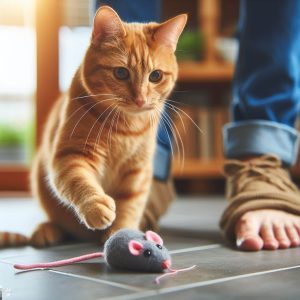Have you ever wondered if you can share your banana with your furry feline friend? You take a bite of the sweet, creamy fruit and your cat looks longingly at you from across the room. Can cats eat bananas too? Are bananas safe for cats to eat? What are the potential benefits and risks?
As a cat owner, you always want to make sure you are providing your cat with optimal nutrition. Understanding what human foods are safe for cats is an important part of caring for your pet. Keep reading this comprehensive guide to find out everything you need to know about feeding bananas to cats.
An Overview of Bananas for Cats
Bananas are not toxic to cats and are generally considered safe to eat in small amounts as an occasional treat. Both the fruit flesh and peel of bananas contain nutrients that may provide health benefits for cats. Bananas are high in potassium, vitamin C, vitamin B6, and dietary fiber.
However, bananas are high in natural sugar and carbohydrates. The high calorie and starch content means bananas should only be fed to cats in moderation. Bananas have minimal nutritional value compared to your cat’s normal diet and should not make up a significant portion of daily calories.
Think of bananas for cats more as a snack than a dietary staple. Only feed your cat a few small, bite-sized pieces of banana at a time. Too much can lead to obesity, diabetes, or digestive upset. Consult your veterinarian before making bananas a regular part of your cat’s diet, especially for cats with medical conditions.
Nutritional Breakdown of Bananas for Feline Health
Let’s take a closer look at the nutritional contents of bananas and what they mean for your cat’s health:
Potassium – Bananas are well known for being a rich source of potassium. This essential mineral supports nerve function, muscle control, blood pressure, and kidney health in both humans and animals. Cats with kidney disease may benefit from the potassium content of bananas.
Fiber – Bananas contain both soluble and insoluble fiber, which can support digestive health in cats. Soluble fiber can help with constipation by adding bulk and moisture to the stool. But too much fiber from bananas can also cause loose stools.
Vitamin C – Also called ascorbic acid, vitamin C is an antioxidant that supports immune function and collagen production. Your cat’s body can synthesize vitamin C on its own, so dietary sources are not essential.
Vitamin B6 – This B vitamin in bananas helps the body metabolize protein and carbs. It also supports red blood cell production and neurological function. But most commercial cat foods already provide ample B6.
Carbs and Sugar – Bananas have a high glycemic index due to natural sugars like sucrose, glucose, and fructose. The carbs and sugar in bananas should be limited for diabetic cats or felines needing to lose weight.
Calories – A medium banana contains around 105 calories. The calories from bananas and other treats should be accounted for so cats don’t take in excess calories leading to obesity.
Pro Tips for Feeding Bananas to Cats
Now that you know the nutritional contents and understand the health impacts, here are some tips for safely feeding bananas to cats:
Choose Ripe Bananas
Always select bananas that are fully ripe but not overripe to share with your cat. Unripe bananas can be difficult to digest. Overripe, browning bananas tend to have higher sugar content. The ideal ripeness has bright yellow peel with a few brown speckles.
Peel vs. Flesh
Both the peel and inner fruit flesh of bananas are safe for cats to eat. In fact, the peel contains more fiber and nutrients than the flesh. You can offer your cat a piece of peel or serve banana slices with some peel still attached. This gives them the option to nibble both parts.
Slice into Bite-Sized Pieces
Before serving banana to your cat, slice it into small, bite-sized pieces. Large chunks of banana can present a choking risk for cats. Thin slices or tiny chunks are safer and easier to chew. For kittens or cats with dental issues, mash the banana into a soft puree for the safest consistency.
Feed Occasionally in Moderation
As with any treat for cats, moderation is key when feeding bananas. Limit your cat to only 1-2 slices or chunks of banana around 2-3 times per week. Feeding bananas too frequently or in excess can lead to weight gain, diarrhea, and other issues.
Mix with Other Foods
You can mix a mashed banana in with your cat’s wet food. This masks the strong scent and makes the fruit more enticing to finicky felines. Stir just a teaspoon or two of banana into a whole can of wet cat food. Combining banana with their other foods prevents over consumption.
Supervise Your Cat
When first introducing bananas, supervise your cat to monitor their reaction. Make sure they properly chew the fruit before swallowing. Watch for signs of an upset stomach or allergic reaction. Discontinue feeding bananas if any symptoms appear.
With these tips, bananas can be a safe, nutritious cat treat without overdoing the sugar content. Let’s look next at the potential benefits and risks of bananas for cats.
Potential Feline Health Benefits of Bananas
In moderation, bananas may offer some health benefits for your feline friend:
1. May help relieve constipation – The fiber in banana can add bulk to your cat’s stool, acting as a natural laxative for constipation relief. The potassium can also help hydrate the intestines.
2. Boosts energy – The natural sugars and carbs in banana provide a quick energy boost. Just a few bites before playtime can help an energetic kitten or adult cat burn off the fuel.
3. Supports muscle function – The potassium in bananas may help reduce muscle cramps and spasms. This makes bananas potentially helpful for senior cats with arthritis.
4. Aids digestion – Banana’s soluble fiber can soothe digestion, especially for cats with diarrhea. But too much can cause constipation, so feed in moderation.
5. Settles upset stomach – The bland flavor and smooth texture of banana can help settle a cat’s upset tummy. Banana binds stools for cats with diarrhea while providing potassium to replenish electrolyte loss.
6. Provides antioxidants – Vitamin C and other antioxidants in bananas can boost immune function and support overall health. But cats already synthesize adequate vitamin C on their own.
These potential benefits make bananas worth considering as an occasional treat. But don’t rely on bananas alone to manage specific health conditions in cats. Always consult your veterinarian first. Next, let’s look at the possible risks of feeding bananas.
Potential Health Risks of Bananas for Cats
While bananas are not toxic to cats, there are some potential downsides to be aware of:
1. Digestive upset – Too much banana can lead to vomiting, diarrhea, gas, and abdominal pain if a cat is sensitive to the high sugar and fiber. Feed minimally at first and discontinue if these symptoms appear.
2. Weight gain – Bananas are high in calories and carbs. Feeding too much can cause obesity, which leads to other feline health problems. Omit bananas for overweight or inactive cats.
3. Diabetes risk – The natural sugar and carbohydrates in bananas can negatively impact blood sugar levels, especially in diabetic cats or those prone to diabetes.
4. Allergies – Some cats may have food sensitivities, intolerances, or even a rare allergy to bananas. Discontinue feeding if you observe any signs of an allergic reaction.
5. Dental issues – The stickiness of bananas can get stuck in cats’ teeth. The sugar content also promotes tartar and bacteria growth. This can aggravate dental diseases.
6. Choking hazard – Any human food poses a risk of choking if not chewed properly. Always monitor your cat when feeding bananas and cut into tiny, bite-sized pieces.
To keep your cat healthy and avoid these risks, feed bananas sparingly as described in the portion guidelines next.
Proper Portion Sizes for Cats
How much banana can cats eat safely? Follow these recommended portion guidelines:
- For a 3-5 lb kitten, limit to 1-2 small chunks or slices twice a week.
- For a 5-10 lb adult cat, feed 2-3 thin banana slices 2-3 times per week at most.
- For a 10+ lb large cat, 3-4 small chunks is sufficient 2-3 times weekly.
- Diabetic cats should avoid bananas entirely due to sugar content.
- Overweight cats or those needing to lose weight should not eat bananas.
- Adjust portions based on your cat’s size and activity level. Less active cats need smaller portions of banana.
Moderation is key when feeding any fruit treat like bananas to cats. Let your cat’s health condition, age, weight, and lifestyle dictate proper portion sizes.
The Verdict: Should You Feed Your Cat Bananas?
In conclusion, most experts agree that bananas are generally safe for cats to eat in moderation. A few bites of banana flesh or peel 2-3 times a week makes an acceptable snack. Bananas can provide nutritional benefits when fed occasionally and in small amounts.
However, bananas should never become a dietary staple or replace your cat’s normal food. They have minimal nutritional value compared to commercial cat food formulas. The fiber, natural sugar and calories of bananas can become problematic if overfed.
Speak with your veterinarian before feeding bananas to diabetic cats, kittens, or felines with any health conditions. Stop feeding bananas if your cat has diarrhea, constipation, weight gain or an allergic reaction. Only offer ripe bananas and monitor your cat closely for choking.
Overall, bananas make a fine occasional treat for healthy cats. But they should not become a regular part of your feline friend’s diet. Feed bananas in moderation along with proper cat nutrition and care for a happy, healthy pet.
FAQs About Cats and Bananas
Still have questions about feeding bananas to cats? Here are answers to some frequently asked questions:
Are bananas safe for kittens to eat?
Bananas are safe for kittens over 12 weeks old in small amounts 1-2 times per week. Make sure bananas are mashed or sliced thinly to prevent choking. Limit portions to 1-2 chunks for a small kitten. Avoid feeding bananas to kittens younger than 12 weeks.
Can cats eat banana peels?
Yes, the peel of the banana is safe for cats to eat. In fact, banana peels contain more fiber and nutrients than the inner fruit flesh. The peel may help relieve constipation in cats due to soluble fiber content.
Are bananas good for diabetic cats?
No, bananas are not ideal for cats with diabetes or prone to developing diabetes later in life. Bananas have a high glycemic index and can cause dangerous blood sugar spikes. It’s best to avoid bananas entirely for diabetic felines.
Can bananas help a cat gain weight?
Yes, the calories and carbs in bananas can contribute to weight gain if fed in excess. Bananas should be limited for overweight cats or cats needing to lose weight. For underweight cats needing to gain weight, feed a calorie-dense commercial cat food under veterinary guidance.
Do bananas help stop cats vomiting?
Possibly. The bland, smooth texture of bananas can help settle an upset stomach. The fiber also absorbs excess stomach acid. But consult your vet to find the cause of vomiting before treating it with bananas alone.
How much banana should I feed my cat per day?
Cats should get no more than 2-4 small pieces of banana 2-3 times per week. Feeding just a few licks or bites of banana daily is sufficient. Anything more risks weight gain, digestive upset, and other side effects in cats.
The Bottom Line
So can cats eat bananas? In small amounts, ripe bananas can be a safe, nutritious feline treat. They provide fiber, vitamin C, vitamin B6, potassium and other nutrients. But bananas should only be an occasional snack, not a dietary staple. Too much banana can negatively impact a cat’s health and digestion.
Check with your vet before feeding bananas regularly or to cats with medical conditions. Always supervise your cat when providing banana to prevent choking. Limit portions to 2-4 small pieces per cat just 2-3 times a week. Avoid feeding bananas to kittens under 12 weeks, diabetic cats, and overweight or inactive felines.
With proper precautions, a few bites of banana can be a tasty cat treat! But be sure to rely on a balanced commercial cat food diet and veterinary care to keep your cat healthy long-term.



